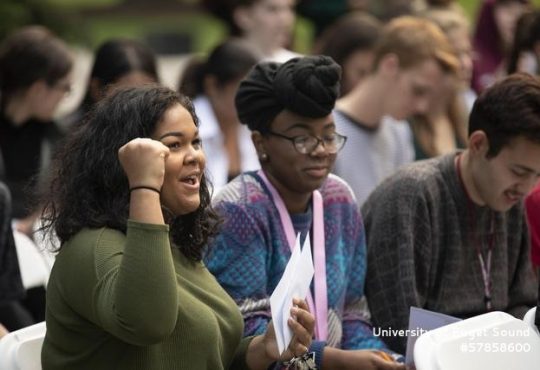The article, “A Second Look on the True Meaning of Diversity” by Jess Wiken seems to imply that selecting a president of color is discriminating against Whites. I’ll start by responding to this argument: reverse-racism is not an accurate concept because White people occupy positions of racial privilege, even when they are disadvantaged in other ways.
White people are not oppressed. The centuries of rampant racism and cultural extinction perpetuated by European Imperialists creates the history of oppression of people of color in the United States. Blacks were enslaved and brought to the New World, while White European colonialists stole land from Indigenous peoples and created a system that put themselves at the top of the pyramid. Today, we’re still living with the legacies of colonialism: In the United States, the black community is still dealing with the aftermath of slavery and the poverty and systemic prejudice it left behind. White people, in contrast with people of color, do not experience systemic discrimination that makes it difficult to find and hold jobs, access housing, get health care, receive a fair treatment in the justice system, and so much more.
Putting an “emphasis on race” when selecting a president is called Affirmative Action or equal opportunity. Saying that selecting a candidate based on their race or gender is “discrimination and unequal selection” is ignoring the centuries of discrimination and injustice. Ignoring race or gender is ignoring an entire person and their identity, that is colorblind racism. White people who complain about reverse racism are actually complaining about being denied their privileges, rather than being denied their rights. Wiken argues that “the selection process should solely rest on the candidate’s competency and their ability to best advance the interest and goals of the University.” We are not advocating for a random Black person to be picked off the street without addressing their qualifications. This argument ignores that there are extremely qualified people of color in this country. We want a president of color because we don’t feel that our current president reflects our experiences as students of color at UPS, not because we want a token person of color to represent our school. We need equal opportunity to reverse the negative effects caused by years of discrimination, to make sure minorities are represented at schools and in the workforce, and to create an equal opportunity for everyone by helping those individuals that have been at a disadvantage for years. Discrimination continues to deny opportunities to minorities and women to this day. We want an equal playing field, not a head start.
Wiken’s main argument, from my understanding, is that “the cost [of tuition] is largely responsible for the lack of diversity on campus” but what Wiken fails to acknowledge is that the people making the decisions to raise the tuition higher than it already is are rich white men. If we want to make this school more “diverse” we need to be accessible and inclusive to people of color who are disproportionately lower income, and to do that we need to have someone making decisions that experiences those oppressions daily. Having a president of color is a step forward in solving the lack of funding for multicultural programs. Having a president of color will be moving in the direction that we both want, as they would be more likely to allocate more money to identity and culturally-based clubs. Having this background makes them more equipped to hear and care about the voices from marginalized groups. White people are making the decisions to make tuition what it is, economic, political and social issues are not in separate boxes.
The article is titled “True Meaning of Diversity” as if they know what that term even means, as if they are part of the marginalized voices on campus, as if once again exercising their privilege as a White student at UPS is sufficient to know the answers to these questions they can’t even understand. Ms. Wiken needs to consider the fact that they are White and that they don’t have to struggle with finding their place on this campus. They should recognize that they never have to think about race because they are a member of the dominant group. Conversations about race and diversity are always centered around White feelings but this letter is not. Ms. Wiken uses ethnicity, which is defined as the fact or state of belonging to a social group that has a common national or cultural tradition, instead of using race when talking about racial diversity. They didn’t want to use the word race to not come off as racist but also because the word ethnicity has less baggage. You can chose your ethnicity, you can define it yourself. Yes, you are born into that situation but you are not branded with it, as opposed to race where it is a very visible identity.
As a student of color that participated in this Presidential Selection Committee, yes, there were students representing culturally-based and identity-based clubs but there were also White students representing other groups on campus including Greek Life and ASUPS. As a student of color on this campus I am deeply offended and saddened by the fact that people at this school see me as just another percentage or number contributing to “diversity.” As a student of color my voice is commonly silenced by people on this campus like Ms. Wiken that continue to believe that Affirmative Action is reverse racist because they think that their privilege is being taken away from them. As a student of color, I am replying to this article because I am advocating for a president of color that will understand my needs as a student.
Thank you for your time,
Amanda Diaz ‘18
adiaz@pugetsound.edu
Latinos Unidos President
Advocates for Detainees’ Voices President



